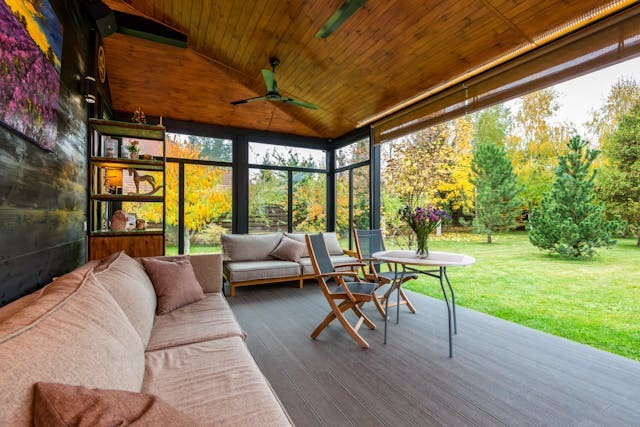Building an environmentally friendly backyard not only benefits the environment but is also a satisfying approach to improve your outdoor living area in a time when sustainability is starting to take front stage for homeowners. There are lots of methods to create a sustainable backyard that fits your ideals from including natural surroundings to applying energy-efficient technologies.
Including environmentally friendly deck lighting ideas is crucial for this transformation to improve the attractiveness and utility of your area and reduce the impact you have on the natural environment.
Why Sustainable Backyards Matter
A sustainable backyard is more than simply an outdoor haven; it’s an important step in lowering your carbon footprint. Appropriate design decisions can help you to maintain local ecosystems, save resources, and establish a refuge in harmony with the surroundings. Let’s investigate some imaginative and practical ways to transform your yard into a sustainable masterpiece.
1. Choose Native and Drought-Tolerant Plants
Choosing native, drought-tolerant plants for your garden will help you to embrace sustainability in one of the easiest and most powerful ways. These low-water and low-maintenance plants are suited for your local environment. Native plants help local biodiversity by supporting pollinators such as bees and butterflies as well.
To give your landscape texture and charm, add shrubs, decorative grasses, and vibrantly colored perennials. Retain soil moisture by using mulch, therefore lowering the requirement for regular watering.
2. Invest in Solar-Powered Lighting
Particularly after sunset, lighting is absolutely essential for a functional and friendly backyard. However, conventional outdoor lighting can be somewhat energy-intensive. Choosing solar-powered lights is an environmentally friendly alternative that not only cuts your impact on the environment but also your power costs.
Ideas for solar-powered deck lighting are particularly useful to illuminate paths, patios, and seating areas without depending on fossil-fuel-based electricity. These low-maintenance, environmentally friendly lights gather sunlight and turn on automatically at dusk.
3. Repurpose and Recycle Materials
Repurpose and recycle existing materials for your garden design to give them new life. Create garden beds or seats out of salvaged wood, or use old bricks for patios and paths. Vertical gardens created from pallets save room by incorporating vegetation.
Along with cutting trash, repurposing gives your outdoor area a distinctive, rustic appeal. Repurposed materials create one-of- a-kind backyards and tell a story.
4. Install a Rainwater Harvesting System
One of the most valuable resources available is water; thus, sustainability depends on its preservation. Installing a rainwater collecting system lets you gather and save rainwater for outdoor usage including gardening. While more sophisticated configurations can incorporate underground cisterns and filtration systems, simple systems could be made up of rain buckets attached to your gutters.
Using collected rainwater helps you to lessen your dependence on municipal water sources and guarantee that your garden thrives even in dry seasons.
5. Use Permeable Surfaces
Conventional asphalt and concrete surfaces can aggravate water runoff, which sometimes transfers contaminants into nearby streams. To let rainwater trickle into the ground, substitute permeable surfaces include gravel, porous pavers, or natural stone for these elements. This helps to restore groundwater supplies and lessens runoff.
Permeable surfaces enhance the visual appeal of your backyard while improving drainage and soil health.
6. Incorporate Edible Landscaping
Plant edible landscaping to combine utility and beauty. While they offer fresh, organic food, vegetables, herbs, and fruit-bearing plants can also be decorative accents. Great additions supporting sustainability and a farm-to- table way of life are Berry bushes, citrus trees, and herb gardens.
Edible landscaping lessens the demand for store-bought food, therefore lowering packaging and transportation emissions.
Final Thoughts
Building a sustainable backyard offers a chance to enjoy the advantages of nature while embodying your ideals. Each decision you make, whether it’s to use solar-powered lights for deck lighting ideas or to incorporate native plants and recycled materials, adds to a more sustainable future.
Small, deliberate actions will help you turn your outside space into an environmentally responsible haven. Accept the potential of sustainable design and savor the benefits of a backyard flourishing in harmony with the environment.
The New Jersey Digest is a new jersey magazine that has chronicled daily life in the Garden State for over 10 years.
- Staffhttps://thedigestonline.com/author/thedigeststaff/
- Staffhttps://thedigestonline.com/author/thedigeststaff/
- Staffhttps://thedigestonline.com/author/thedigeststaff/
- Staffhttps://thedigestonline.com/author/thedigeststaff/


